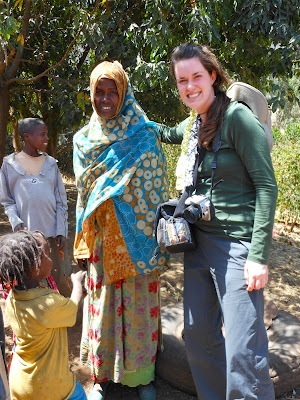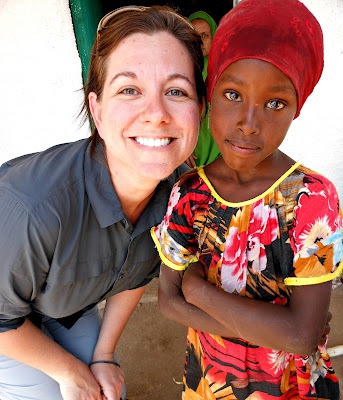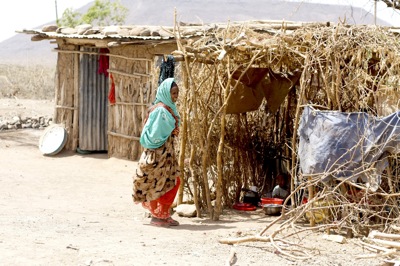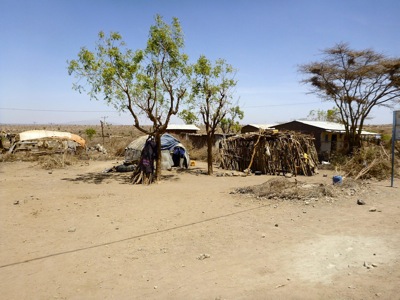Tuesday, April 10th, 2012
Facing down Poverty
Celina native travels to Ethiopia to offer aid
By Margie Wuebker

Submitted Photo
Villagers enjoyed having their pictures taken with Heather McClellan and other visitors. For many, it marked the first time they had seen their own image.
Heather McClellan came face to face with poverty during a recent trip to Ethiopia.
And yet she found the people - young and old - to be happy and affectionate. They sleep in spartan huts built of sticks and survive on just one meal per day, but the hope for a better tomorrow keeps them going.
McClellan's trip was under the auspices of Global Hope Network International, a non-profit, private humanitarian aid organization committed to bringing change to poor villages throughout the world. Benefactors like McClellan, a lab technician at a chemical manufacturing company in Lima, are committed to helping people become strong and independent so they can break free from poverty.
The Celina native and her son Zander learned about the program more than a year ago. They sponsor a family in the Ethiopian village of Megaladi for $12 per month.
"I can spend more than that in one trip through McDonald's," she admitted with a smile. "It is amazing what a small amount of money from a lot of people can accomplish."
McClellan and three other mothers from the U.S. were selected to spend Feb. 22 to March 4 in Ethiopia as part of one of the organization's compassion trips. Each of the travelers shared her experiences through blogs. Their focus while there was helping with a Transformational Community Development project, a three- to five-year effort to help villagers achieve safe water supplies, food sources, education and self-sustaining income.
"Villagers in Megaladi and neighboring Garmaam are willing to listen, learn and work hard," McClellan said. "They are committed to making their village a healthy and viable community for the next generation."
The first hurdle involves water. One year ago, Garmaam was hardly more than a wide spot in the main dirt road with a contaminated stream running through the settlement. Today the people draw water from a well and also have a wellness clinic and small school.
Megaladi, a village of approximately 250 families, also is rebounding as residents band together to make necessary changes with the organization's help.
"The people are poor with many families subsisting on $1 per day," McClellan said. "I had money in my wallet, but the problem was deciding who needed it the worst. When you are in the middle of nowhere, $5 here and there does not mean that much."
The normal diet includes rice and whatever vegetables can be grown despite persistent drought. The group did see some cabbage, corn and tomatoes growing in small garden plots.
Villagers raise small flocks of goats and collect stacks of wood to sell in nearby cities. However, the saltiness of their water sources is not conducive to agriculture. Efforts are under way to create a filtration system.
McClellan remembers the long and dusty drive from the larger village of Dire Dawa, which served as home base during her trip. Their Land Rover bounced over dirt roads, stopping periodically to allow goats, donkeys and camels to cross.
"Nothing prepared me for what I found," she said. "People live in stick huts held together with mud. There is no infrastructure let alone running water, flush toilets or proper sanitation."
The travelers snapped lots of pictures during their stay. Adults as well as children quickly gathered around to see their images for the first time.
Language was not a barrier.
"It is amazing what can be said and not said," McClellan said. "Two or three languages may be spoken in some villages and an interpreter is not always available."
The visitors and organization representatives did have an interpreter when they met with village committees. At other times, they relied on body language and hand signals.
McClellan specifically remembers two little girls who came forward shortly after she and the others had arrived. Within minutes, they were holding hands as the girls chattered and smiled broadly.
"The question is not will I go back; the question is when will I go back," she said.
For more information, visit McClellan's blog at http://journeyheather.blogspot.com or the organization website at globalhopenetwork.org.

Submitted Photo
Former Celina resident Heather McClellan, now of Lima, poses with a young girl from the Ethiopian village of Megaladi.

Submitted Photo
An Ethiopian woman heads toward her house made of twigs and mud. The people in villages like Megaladi and Garmaam subsist on approximately $1 a day. Global Hope Network International is working with the people on achieving safe water supplies, better education and self-sustaining income opportunities.

Submitted Photo
Settlements like this one appear to be carved out in the midst of the rain-starved Ethiopian countryside. Heather McClellan, a former Celina resident, and three other women accompanied Global Hope Network International officials on a trip to the country in February.




